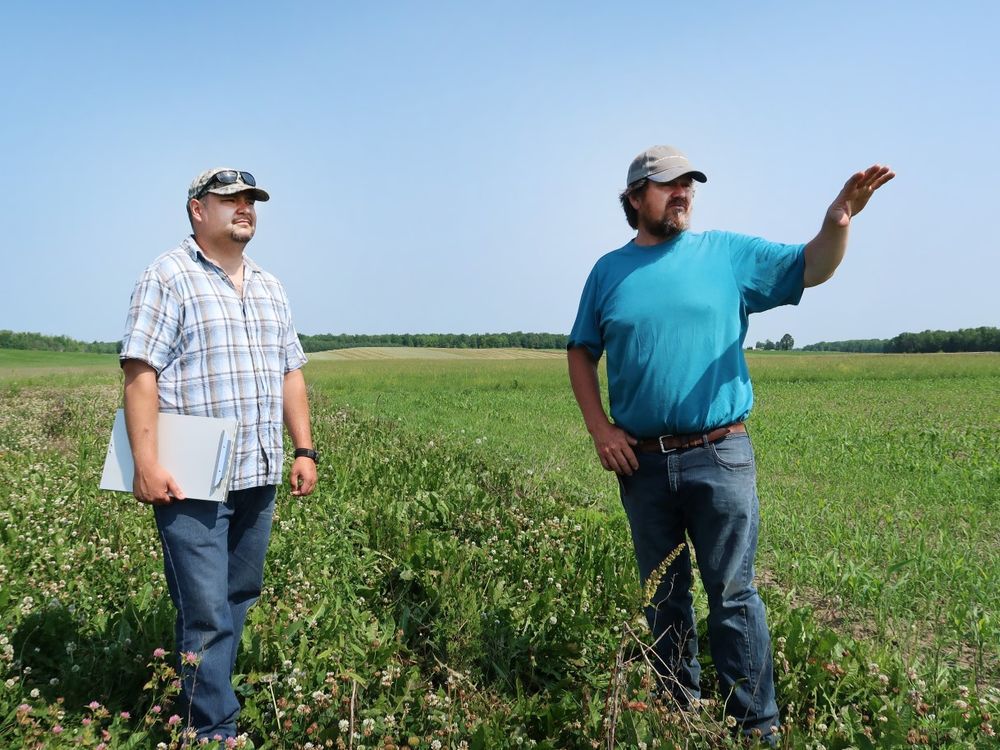 John LaRose Jr.
John LaRose Jr.
Topics: Precision AG , Agriculture Global, Young Farmers, Economics, Government / Policies, Ag Africa,
Youth involvement in agric sector, will aid food security – Expert
Stakeholders have called for deliberate efforts to involve the youth in agriculture, for economic growth, food security, to reduce unemployment and other social vices. Speaking in separate in…
-
(0)
-
Bookmark
- Comments (0)
 John LaRose Jr.
John LaRose Jr.
Topics: Livestock/Meat, Agriculture Global, Economics, Beef Cattle, Goats, Government / Policies, Ag Australia/NZ,
Scottish Agricultural Show 2021: Cattle and goat judges confirmed
A trio of well-respected stocksmen and women have been unveiled as judges for the cattle and goat sections at the Scottish Agricultural Show.
-
(0)
-
Bookmark
- Comments (0)
 John LaRose Jr.
John LaRose Jr.
Topics: Precision AG , Crop Consultant, Agriculture Global, Economics, Sustainability, Research, Ag India, Ag Innovation, World Hunger, Government / Policies,
Govt. to link innovative agriculture technologies to farms to help farmers in Northeast region
70% of the workforce is engaged in agriculture and allied sectors for livelihood in the region , the S&T ministry said
-
(0)
-
Bookmark
- Comments (0)
 John LaRose Jr.
John LaRose Jr.
Topics: Precision AG , Agriculture US, Crop Consultant, Agriculture Global, Economics, Sustainability, Government / Policies,
New RRCA Agri-Action Advisory Service looking to help local farmers
Conservation authority announces funding program to assist farmers with implementing best practices on their lands.
-
(0)
-
Bookmark
- Comments (0)
 John LaRose Jr.
John LaRose Jr.
Topics: Precision AG , Irrigation, Agriculture Global, Water, Research, Ag Innovation, Weather,
Quickly monitor water quality using microorganisms - Fuentitech
Credit: PIXTA / CC0 public domain Researchers at the Singapore Institute of Technology (SUTD) have demonstrated a technique for rapidly detecting pollutants in water by measuring their effects on swimming microorganisms. Their proof of concept is Science reportNo chemicals, reagents or laboratory equipment required.Instead, take advantage of microorganisms called regular cameras on smartphones. Paramecium Everywhere …
-
(0)
-
Bookmark
- Comments (0)
 John LaRose Jr.
John LaRose Jr.
Topics: Precision AG , Crop Consultant, Agriculture Global, Water, Sustainability, Ag Europe, Weather,
40% of EU agricultural imports will be 'highly vulnerable' to drought by 2050
A trio of researchers has found that approximately 40% of agricultural products imported into the European Union will be "highly vulnerable" to drought by 2050. In their paper published in the journal ...
-
(0)
-
Bookmark
- Comments (0)
 John LaRose Jr.
John LaRose Jr.
Topics: Commodities, Agriculture Global, Fruit, Trade (Commodities), Ag Africa, Ag Podcast Global, Commodity/Trade Groups,
BUSINESS MAVERICK: Agricultural rebound: South Africa’s citrus exports heading for a record year
South Africa’s citrus industry, which looks set to export a record 160 million cartons this season, has its first shipment of produce heading to the Philippines. Commodity exports, grown or mined, are leading the economic recovery.
-
(0)
-
Bookmark
- Comments (0)
 John LaRose Jr.
John LaRose Jr.
Topics: Agriculture Global, Food/Nutrition, Sustainability, World Hunger, World Population, Regenerative Agriculture, Food Security/Shortage,
To Reverse Food Insecurity Build a Climate Resilient Agricultural Sector
The continued increase in food insecurity is making it clear that our current food systems are not resilient. How can we reverse these worrisome trends?
-
(0)
-
Bookmark
- Comments (0)
 John LaRose Jr.
John LaRose Jr.
Topics: Agriculture Global, Food/Nutrition, Sustainability, World Hunger, Government / Policies, World Population, Food Security/Shortage,
-
(0)
-
Bookmark
- Comments (0)
-
(0)
-
Bookmark
- Comments (0)











 Nancy Kavazanjian
Nancy Kavazanjian

